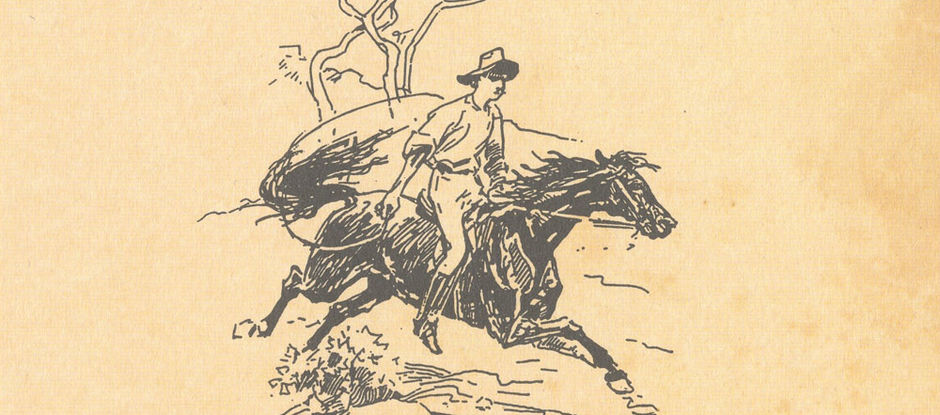Look at an Australian ten dollar note and there you have it; Mr Banjo Paterson. The poet, journalist and author was a voice many people related to during a time when the very essence of what it means to be an Australian settler was being defined.
I have read reviews saying that Paterson’s writings of rural Australia are very romantic, referring to the fact he was educated and worked as a lawyer. I disagree. If you look past the poetry of Waltzing Matilda you find a myriad of ballads dedicated to the harsh life and real stories many people faced living in the nineteenth century.
The ‘bush ballad’ is a style of poetry that tells a story about life in the country. The verses may have a light, humorous tone but it reveals something deeper about the spirit of the people and the land. The writings of Banjo Paterson have had a great influence on Australia’s identity and continue to play a role in how singers, writers and artists describe this country today.
What I love about authors such as Banjo Paterson and Henry Lawson, another renowned Australian poet, is their ability to tell stories. One particular artist, of this time, that comes to mind is Paul Kelly. Quoted by a Rolling Stones journalist as “one the finest song writers he has ever heard”. I believe there aren’t many people that can tell a ‘yarn’ and conjure images through music and words like him.
So, where am I going with this? I guess that as our attention spans start to decrease with the high-speed rate of information consuming. I really hope we don’t lose our ability to tell a story or enjoy one, for that matter.
And with that final thought, I’ll leave you with a bush ballad I’ve only recently discovered but thoroughly enjoyed by the man himself...Banjo Paterson.
In Defence of the Bush
So you're back from up the country, Mister Lawson, where you went,And you're cursing all the business in a bitter discontent;Well, we grieve to disappoint you, and it makes us sad to hearThat it wasn't cool and shady-and there wasn't whips of beer,And the looney bullock snorted when you first came into view-Well, you know it's not so often that he sees a swell like you;
And the roads were hot and dusty, and the plains were burnt and brown,And no doubt you're better suited drinking lemon-squash in town.Yet, perchance, if you should journey down the very track you wentIn a month or two at furthest, you would wonder what it meant;Where the sunbaked earth was gasping like a creature in its painYou would find the grasses waving like a field of summer grain,And the miles of thirsty gutters, blocked with sand and choked with mud,You would find them mighty rivers with a turbid, sweeping flood.
For the rain and drought and sunshine make no changes in the street,In the sullen line of buildings and the ceaseless tramp of feet;But the bush has moods and changes, as the seasons rise and fall,And the men who know the bush-land-they are loyal through it all.But you found the bush was dismal and a land of no delight-Did you chance to hear a chorus in the shearers' huts at night?
Did they "rise up William Riley" by the camp-fire's cheery blaze?Did they rise him as we rose him in the good old droving days?And the women of the homesteads and the men you chanced to meet-Were their faces sour and saddened like the "faces in the street"?And the "shy selector children"-were they better now or worseThan the little city urchins who would greet you with a curse?Is not such a life much better than the squalid street and squareWhere the fallen women flaunt it in the fierce electric glare,Where the sempstress plies her needle till her eyes are sore and redIn a filthy, dirty attic toiling on for daily bread?
Did you hear no sweeter voices in the music of the bushThan the roar of trams and buses, and the war-whoop of "the push"?Did the magpies rouse your slumbers with their carol sweet and strange?Did you hear the silver chiming of the bell-birds on the range?But, perchance, the wild birds' music by your senses was despised,For you say you'll stay in townships till the bush is civilized.
Would you make it a tea-garden, and on Sundays have a bandWhere the "blokes" might take their "donahs", with a "public" close at hand?You had better stick to Sydney and make merry with the "push",For the bush will never suit you, and you'll never suit the bush.
— A. B. “Banjo” Paterson

